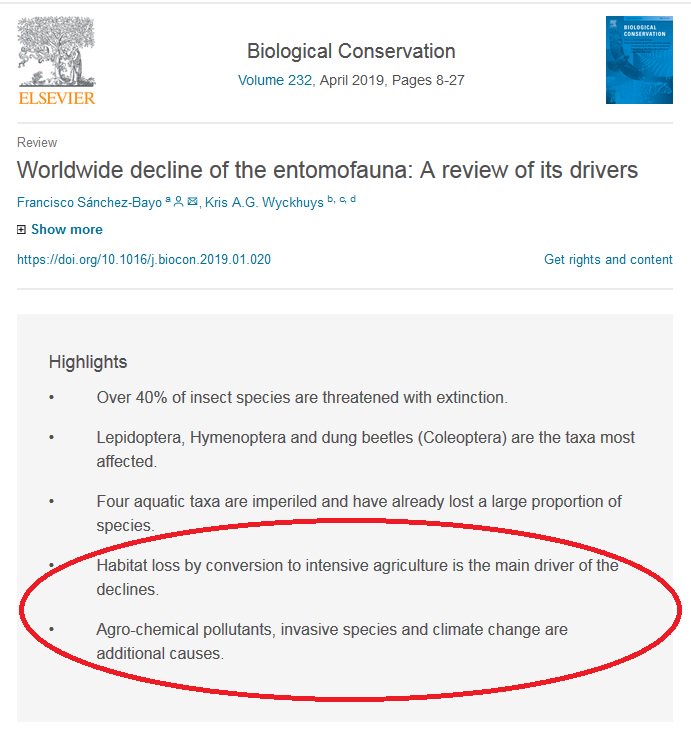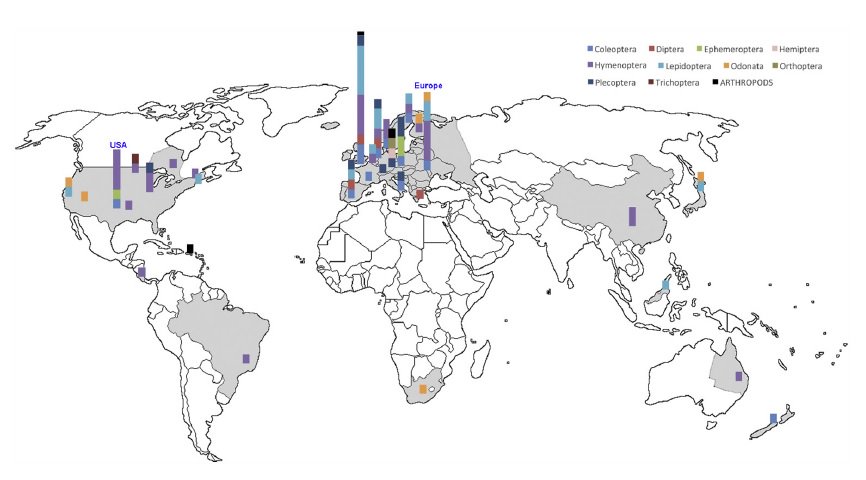You are using an out of date browser. It may not display this or other websites correctly.
You should upgrade or use an alternative browser.
You should upgrade or use an alternative browser.
Insects on the brink
- Thread starter Bogweevil
- Start date
What do the bar graphs represent? Losses?
I'd dig deeper on articles like this. Around here we get slammed for environmental destruction yet in the last 5 years we've done more than ever to re-establish habitats. We've just had our farm cluster facilitator survey the estate for all wildlife and found dozens of endangered species that weren't being monitored. Some of those were classified as virtually extinct yet with little effort there they still are.
If you don't measure it you can't manage it. Too many green agendae singing for their own supper at agriculture's expense.
I'd dig deeper on articles like this. Around here we get slammed for environmental destruction yet in the last 5 years we've done more than ever to re-establish habitats. We've just had our farm cluster facilitator survey the estate for all wildlife and found dozens of endangered species that weren't being monitored. Some of those were classified as virtually extinct yet with little effort there they still are.
If you don't measure it you can't manage it. Too many green agendae singing for their own supper at agriculture's expense.
I think there has been a big decline in insect numbers - don’t need fancy, expensive studies to tell you what the average summer windscreen or number plate will
As @Brisel says though so much of this is easy fixed - trouble is all the money to make stuff actually happen goes to people who reaserch / talk about problems and not to the people who can actually facilitate change
With the right support and a major cull of the “hangers on” who our industry is swamped with and currently consume most of the money there is massive opportunity for us as farmers to fix a lot of environmental issues
As @Brisel says though so much of this is easy fixed - trouble is all the money to make stuff actually happen goes to people who reaserch / talk about problems and not to the people who can actually facilitate change
With the right support and a major cull of the “hangers on” who our industry is swamped with and currently consume most of the money there is massive opportunity for us as farmers to fix a lot of environmental issues
Last edited:
Bogweevil
Member
What do the bar graphs represent? Losses?
I'd dig deeper on articles like this. Around here we get slammed for environmental destruction yet in the last 5 years we've done more than ever to re-establish habitats. We've just had our farm cluster facilitator survey the estate for all wildlife and found dozens of endangered species that weren't being monitored. Some of those were classified as virtually extinct yet with little effort there they still are.
If you don't measure it you can't manage it. Too many green agenda singing for their own supper at agriculture's expense.
Bar graphs - number of insect orders covered by research, not numbers of insects - moth, beetles, bee etc - much data from Europe, much less from rest of world
'done more than ever to re-establish habitats' - that is what puzzles me - years of environmental schemes but little to show apparently, but perhaps we are not looking hard enough and just relying on indicator species?
- Location
- Cheltenham
Correct, action not words are needed. Can’t remember when my windscreen was last covered in flies! Must have been 20 years agoI think there has been a big decline in insect numbers - don’t need fancy, expensive studies to tell you what the average summer windscreen or number plate will
As @Brisel says though so much of this is easy fixed - trouble is all the money to make stuff actually happen goes to people who reaserch / talk about problems and not to the people who can actually facilitate change
With the right support and a major cull of the “hangers on” who our industry is swamped with and currently consume most of the money there is massive opportunity for us as farmers to fix a lot of environmental issues
Last edited:
- Location
- S E Glos
"Conversion to intensive agriculture" in Europe at least happened decades ago. Much remedial work has been done since. They'll be on about grubbing up hedgerows next.
Correct, action not words are needed. Any remember when my windscreen was last covered in flies! Must have been 20 years ago
There was a thread about less bugs on windscreens a while ago. Some of it will be due to better car aerodynamics and some bad springs weatherwise but I think there’s some truth in what you say.
More research needed...
Prince Charles has come out with some waffle in his time, but the one thing he said - in respect of environmental degradation - which was spot on was this: "By the time we have the diagnosis the patient will be dead" ie less talk more action.
I normally find there is only one to two weeks a year when you seem to get lots in insects splatting on your windscreen, and it is very weather dependant. Maybe this is due to flight patterns, insect growth stages etc...There was a thread about less bugs on windscreens a while ago. Some of it will be due to better car aerodynamics and some bad springs weatherwise but I think there’s some truth in what you say.
Steevo
Member
- Location
- Gloucestershire
How crazy.....humans kidding themselves they are "saving" the insects. Humans are the problem, not the solution.
Intensive agriculture is only providing food for those humans as cheap as possible
Urbanisation is only providing homes for them as cheap as possible
Insects have become the accidental tragedy of the race to the bottom.
Intensive agriculture is only providing food for those humans as cheap as possible
Urbanisation is only providing homes for them as cheap as possible
Insects have become the accidental tragedy of the race to the bottom.
I was pointed to an article about this yesterday and while insects may be declining the research was so flawed it was nonsense, to start with they said numbers have been falling at 2.5% for the last 30 years yet their figures said numbers were down around 10% over the 30 years which just doesnt add up. Then they balme more industrial farming and ripping out hedgerows which as already been pointed out has stopped in not reversed, they also blamed neo nics which could be responsible but are now mostly banned, they also mentioned the same loss in areas of the world where ag is veru basic or non existent, according to them the reason in those areas was climate change not ag, one beetle in particular was the lose of dung beetles, I remember panacur being blamed for the decline in them many years ago, I wonder how the push to go vegan will affect the numbers of beetles that live on animals.
I'm not saying insects arent down but the research seemed to want to blame the easy answer as usual
I'm not saying insects arent down but the research seemed to want to blame the easy answer as usual
kfpben
Member
- Location
- Mid Hampshire
There’s been a lot more insects around here since livestock came back to the farm.
It made me laugh/weep on Jeremy Vine when they sent the reporter out to find some insects in Hyde Park....it’s Feburary!! Hardly going to be clouds of midges about are there?
It made me laugh/weep on Jeremy Vine when they sent the reporter out to find some insects in Hyde Park....it’s Feburary!! Hardly going to be clouds of midges about are there?
Think how many bugs just one 36 metre SP sprayer can kill in a season.
Many billions probably.
Many billions probably.
A H N
Member
- Location
- Aberdeenshire
Plenty insects up here even midgies just now and it’s supposed to be winter. Cars are far more aerodynamic nowadays which makes a big difference also a lot of them have bug deflectors fitted. Usually warm moist weather is when you see most insects, if it’s very dry you usually see less.
Cowabunga
Member
- Location
- Ceredigion,Wales
Think how many bugs just one 36 metre SP sprayer can kill in a season.
Many billions probably.
About as many as three 12m ones or one 12m sprayer run for three times as long.
There are not noticeably less insects around these parts. It varies hugely from year to year and, from my observation, how kind the Spring is to the first annual generation. If lots breed early then numbers can be many times other less favourable years by August and September. Grassland spiders, for instance, can in some years absolutely cover fields with cobwebs, yet in other years will go un-noticed. Same with daddy longlegs/leatherjackets and ladybirds. Some years I hardly see a ladybird but in other years my grass mower cowling is inches deep in them while working.
Cowabunga
Member
- Location
- Ceredigion,Wales
Actually today's cars are so aerodynamic on the whole that most flying bugs apart from the bigger and heavier ones are swept over and around the car without ever touching the body or windscreen.Too many cars on the road killing all the insects compared to years ago and too many houses being built on fields when theres plenty or run down areas in towns that could be re-developed.
To many people walking in the countryside
Too many people full stop.
May Event: The most profitable farm diversification strategy 2024 - Mobile Data Centres
Apr
02
- 660
- 2
With just a internet connection and a plug socket you too can join over 70 farms currently earning up to £1.27 ppkw ~ 201% ROI
Register Here: https://www.eventbrite.com/e/the-mo...2024-mobile-data-centres-tickets-871045770347
Tuesday, May 21 · 10am - 2pm GMT+1
Location: Village Hotel Bury, Rochdale Road, Bury, BL9 7BQ
The Farming Forum has teamed up with the award winning hardware manufacturer Easy Crypto Hunter and Easy Compute to bring you an educational talk about how AI and blockchain technology is helping farmers to diversify their land.
Over the past 7 years, Easy Crypto Hunter have been working with farmers, agricultural businesses, and renewable energy farms all across the UK to help turn leftover space into...
Register Here: https://www.eventbrite.com/e/the-mo...2024-mobile-data-centres-tickets-871045770347
Tuesday, May 21 · 10am - 2pm GMT+1
Location: Village Hotel Bury, Rochdale Road, Bury, BL9 7BQ
The Farming Forum has teamed up with the award winning hardware manufacturer Easy Crypto Hunter and Easy Compute to bring you an educational talk about how AI and blockchain technology is helping farmers to diversify their land.
Over the past 7 years, Easy Crypto Hunter have been working with farmers, agricultural businesses, and renewable energy farms all across the UK to help turn leftover space into...







